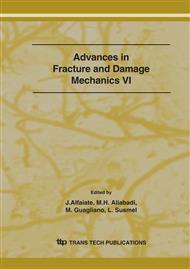p.457
p.461
p.465
p.469
p.473
p.477
p.481
p.485
p.489
A Study on the Development Mechanism of Early Strength in Cement Mortar Using an Early-Strength Polycarboxylated Agent
Abstract:
It is well known that PC (polycarboxylate) agent is superior to other agents for the early-strength of concrete. Thus, this study investigates the development of mortar strength using various agents. To prove this, various factors were tested. Furthermore, this study measured compressive strength at the age of 18, 24, 36, 72, and 168 hours and gave a request text TG/DTA to observe minute structures. In addition, this study took pictures of minute structures using an SEM for each agent at the same age. According to the results, mortar using an early-strength PC agents is faster than a general water reducing AE agent, high performance PC agents, and other agents in the acceleration of hydration at the same early age. A TG/DTA test shows that the early-strength PC agents create more hydration products, such as Ca(OH)2, than others at the same age. The degree of pH in each agent is unrelated to the degree of hydration in mortar. An MIP analysis confirms these results. However, other methods are required the exact analysis of micro structures.
Info:
Periodical:
Pages:
473-476
Citation:
Online since:
September 2007
Authors:
Price:
Сopyright:
© 2007 Trans Tech Publications Ltd. All Rights Reserved
Share:
Citation:


